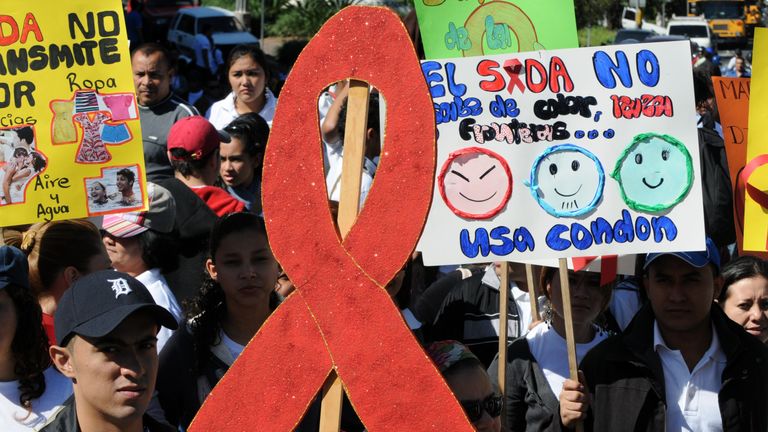By Catrin Rutland, news reporter
HIV is mutating and becoming increasingly resistant to current drugs, the World Health Organisation has warned.
In a new report, the WHO said all antiretroviral drugs, including newer ones, are at risk of becoming totally ineffective due to the virus evolving.
Experts have told Sky News that such drug resistance could be a "barrier to ending the epidemic" and "we have crossed the line".
The problem is particularly acute in parts of sub-Saharan Africa where up to 30% of the population have HIV – the virus which can lead to AIDS.
A four-year study from 2014-2018 by the WHO included 12 countries in Africa, Asia and the Americas where the virus showed unacceptable levels of resistance against two of the main drugs used by HIV patients, the organisation said.
Advertisement
In Honduras, around a quarter of HIV patients have a strain which is resistant to these drugs.
Resistance to efavirenz (EFV) and nevirapine (NVP) has also surpassed 10% of patients in Cuba, South Africa, Nicaragua, Papua New Guinea, Uganda, Namibia, Guatemala, Argentina, Zimbabwe, Eswatini and Nepal, said the WHO.
More from Hiv
Beyond this rate, the risk for prescribing the drugs is too high as resistance could further increase, it added.
The organisation said in such cases, it "recommends moving away" from those drugs to different ones.
The WHO said: "People with drug resistant virus to EFV and/or NVP are significantly more likely to experience virological failure or death, discontinue treatment, and acquire new [HIV drug resistance] mutations."
Among children in nine sub-Saharan countries, half of the HIV-positive infants were resistant to efavirenz, nevirapine or both. But 77% of youngsters were still being prescribed nevirapine despite the WHO recommending an alternative drug which is more suitable.
The study looked at data from 18 countries and found 7.8% of male patients and 11.8% of female patients were resistant to the drugs.

Dr Massimo Ghidinelli, an infectious-disease specialist at the Pan American Health Organisation in Washington DC, told Sky News: "I think we have kind of crossed the line."
He warned: "We need to move ahead with the new [drug] regimes and we need to protect the durability and effectiveness of anti-viral life-saving treatments for millions of people."
Dr Michael Brady, medical director at Terrence Higgins Trust, said: "Drug resistance is a serious issue in terms of the global fight against HIV and something we need to proactively monitor in the UK in order to achieve our goal of ending HIV transmissions by 2030.
"Effective treatment plays a key part in ending HIV transmission and, therefore, preventing drug resistance is essential.
"Treatment works by reducing the amount of HIV in the blood to an undetectable level, which – as well as protecting the immune system from damage – stops HIV from being passed on. Anything that could potentially jeopardise the effectiveness of this treatment, such as drug resistance, presents a barrier to ending the epidemic."
However, the situation in the UK is less dire, with around 7% of patients being resistant to drugs.
This is partly down to more vigorous testing, quicker patient treatment and fewRead More – Source
[contf] [contfnew] 
Sky News
[contfnewc] [contfnewc]






